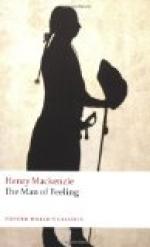An old man, who from his dress seemed to have been a soldier, lay fast asleep on the ground; a knapsack rested on a stone at his right hand, while his staff and brass-hilted sword were crossed at his left.
Harley looked on him with the most earnest attention. He was one of those figures which Salvator would have drawn; nor was the surrounding scenery unlike the wildness of that painter’s back-grounds. The banks on each side were covered with fantastic shrub-wood, and at a little distance, on the top of one of them, stood a finger-post, to mark the directions of two roads which diverged from the point where it was placed. A rock, with some dangling wild flowers, jutted out above where the soldier lay; on which grew the stump of a large tree, white with age, and a single twisted branch shaded his face as he slept. His face had the marks of manly comeliness impaired by time; his forehead was not altogether bald, but its hairs might have been numbered; while a few white locks behind crossed the brown of his neck with a contrast the most venerable to a mind like Harley’s. “Thou art old,” said he to himself; “but age has not brought thee rest for its infirmities; I fear those silver hairs have not found shelter from thy country, though that neck has been bronzed in its service.” The stranger waked. He looked at Harley with the appearance of some confusion: it was a pain the latter knew too well to think of causing in another; he turned and went on. The old man re-adjusted his knapsack, and followed in one of the tracks on the opposite side of the road.
When Harley heard the tread of his feet behind him, he could not help stealing back a glance at his fellow-traveller. He seemed to bend under the weight of his knapsack; he halted on his walk, and one of his arms was supported by a sling, and lay motionless across his breast. He had that steady look of sorrow, which indicates that its owner has gazed upon his griefs till he has forgotten to lament them; yet not without those streaks of complacency which a good mind will sometimes throw into the countenance, through all the incumbent load of its depression.
He had now advanced nearer to Harley, and, with an uncertain sort of voice, begged to know what it was o’clock; “I fear,” said he, “sleep has beguiled me of my time, and I shall hardly have light enough left to carry me to the end of my journey.”
“Father!” said Harley (who by this time found the romantic enthusiasm rising within him) “how far do you mean to go?”
“But a little way, sir,” returned the other; “and indeed it is but a little way I can manage now: ’tis just four miles from the height to the village, thither I am going.”
“I am going there too,” said Harley; “we may make the road shorter to each other. You seem to have served your country, sir, to have served it hardly too; ’tis a character I have the highest esteem for.—I would not be impertinently inquisitive; but there is that in your appearance which excites my curiosity to know something more of you; in the meantime, suffer me to carry that knapsack.”




